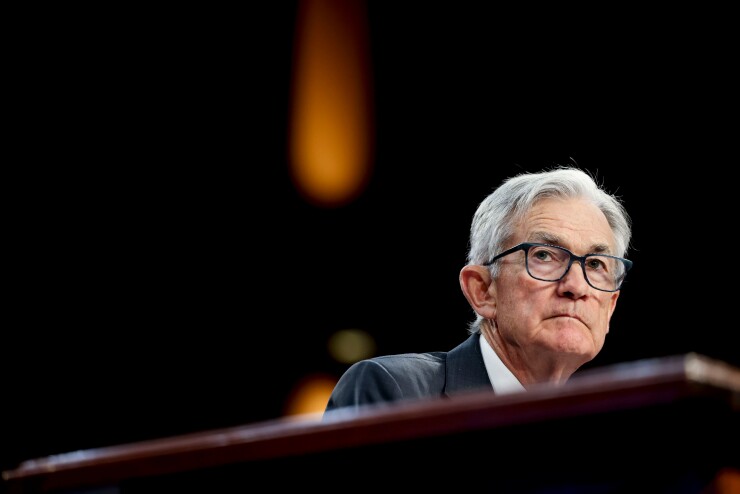
With the Consumer Financial Protection Bureau sidelined, there is no federal regulator examining large banks for consumer compliance, Federal Reserve Chair Jerome Powell told lawmakers on Tuesday, and banking agencies can only do so much to pick up the slack.
Powell said the Fed can still enforce antidiscrimination and consumer protection laws against all the entities it supervises — banking holding companies and state-chartered banks that are members of the Federal Reserve System — but it only has examination teams for banks with less than $10 billion of assets.
Banks above that limit are, at the federal level, the sole responsibility of the CFPB, he said. The Dodd-Frank Wall Street Reform and Consumer Protection Act of 2010, which created the agency, and gave the bureau consolidated oversight authority over large banks as well as non-bank financial institutions.
"We do have some residual enforcement authorities," Powell said, "But what we don't have is examination authority for the banks that the CFPB supervises."
The discussion came during Powell's
Throughout the two-and-a-half-hour hearing, Powell was asked various questions about consumer protection as well as its role in funding the CFPB, which was
Within 24 hours of being placed at the helm last Friday, Vought directed all CFPB employees to
Sen. Elizabeth Warren, D-Mass., the committee's ranking member and a key architect of the CFPB before joining Congress, said the shutdown amounted to telling police officers to stop enforcing laws.
"The CFPB is our law enforcement agency to make sure that the giant banks follow the rules on consumer protection," Warren said. "For me, right now, I'd be really worried about doing business with a giant bank when there's no cop on the beat."
Powell also responded to questions about the Fed's funding of the CFPB, a structure that was also established by Dodd-Frank. Sen. Katie Britt, R-Ala., asked whether the Fed could legally bankroll the bureau when the central bank was, itself, running at a net operating loss.
The Fed, which funds itself through its open market operations associated with its balance sheet, has not been profitable since it began raising interest rates and shrinking its balance sheet in 2022.
"There are only two statutes that require the Fed to make Fed bank assessments and neither permit the CFPB to fund transfers," Britt said. "So what authority, exactly, did the federal reserve have to assess the reserve banks in this manner over the last two years?"
Powell said the Fed has looked into this very question and confirmed that not only can it continue funding the CFPB, but it must.
"We looked at that question very carefully, and it's very clear on the law and the legislative history that we're still required to make those payments," Powell said.
Stress testing
During the hearing, Powell outlined the changes the Fed intends to make to its
The central bank
"On transparency, we're going to release the models, clean them up and publish the models, put them out for comments," he said. "We're also going to release the stress test scenarios before we implement them."
To reduce volatility, the Fed will no longer base each examined bank's stress capital buffer on the results of a single year's projected losses. Instead, it will take the outcome of each exam and incorporate it into a multi-year average.
"The problem is the stress capital buffer will be moving up and down just because of volatility in the results," he said. "It seems like a good idea to smooth that out by averaging over a couple of years."
Powell noted that because the Fed will be conducting a notice-and-comment process on these changes, the exact policy reforms could be subject to change.
Capital reform
In the waning moments of the hearing, Powell shared how the Fed is thinking about the so-called Basel III endgame, the capital reform effort that elicited strong pushback from the banking industry and derailed the Biden-era bank regulatory agenda.
Powell said the Fed intends to finalize a capital rule that aligns the U.S. with other countries involved in the Basel Committee on Banking Supervision, but in a way that results in minimal capital increases for banks.
"My own view has been that our banks are well-capitalized," he said. "Basel III was not supposed to be an exercise in raising capital in U.S. banks. [Former European Central Bank President] Mario Draghi said that, [Former Fed Gov.] Dan Tarullo said that back in the day, I believe, so I think that's about right."
Powell said he was "eager" to
A lighter touch
Another theme of the hearing was the closure of consumer accounts due to regulatory concerns, a concept known as "debanking."
Powell said on multiple occasions that
"We hear a lot of people talk about it and it's time to take a fresh look, I think," he said. "We don't intentionally do these things, but sometimes regulation leads things to happen, and we need to be working on that."
This was not the only unintended consequence on the Fed chairman's mind on Tuesday. Powell also noted that it was important that regulation not incentivize consolidation in the banking sector.
"We've seen the number of community banks declining for 30 years. We don't want to be the cause of that," he said. "If it's happening by natural causes or evolving technology, that's one thing, but we don't want to be inadvertently causing that to happen."






